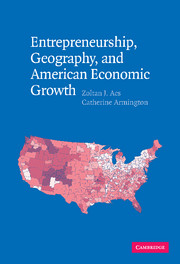Book contents
- Frontmatter
- Contents
- List of Tables and Figures
- Preface
- 1 Introduction
- 2 Entrepreneurship, Geography, and Growth
- 3 Regional Variation in Entrepreneurial Activity
- 4 Human Capital and Entrepreneurship
- 5 Entrepreneurship and Employment Growth
- 6 Summary and Theoretical Insights
- 7 A Formulation of Entrepreneurship Policy
- Appendix A: Firm Formation and Growth Data from the Longitudinal Establishment and Enterprise Microdata (LEEM)
- Appendix B: 1995 + 1996 Firm Formation Rates for U.S. Labor Market Areas with 1994 Labor Force and Establishments
- Appendix C: Service Industry Standard Industrial Classification (4-digit SIC) Codes and Their Subsectors, with 1995 Establishment and Employment and Changes to 1998, and 1996 through 1998 Firm Formations per 100 Establishments in Subsector in 1995
- Appendix D: 1991–1996 Employment Growth Rates and Share of High-Growth Establishments in Labor Market Areas, with 1991 Employment, Establishments, and Population, and 1991–1996 Population Growth and Relative Employment Growth Rates
- References
- Index
3 - Regional Variation in Entrepreneurial Activity
Published online by Cambridge University Press: 31 July 2009
- Frontmatter
- Contents
- List of Tables and Figures
- Preface
- 1 Introduction
- 2 Entrepreneurship, Geography, and Growth
- 3 Regional Variation in Entrepreneurial Activity
- 4 Human Capital and Entrepreneurship
- 5 Entrepreneurship and Employment Growth
- 6 Summary and Theoretical Insights
- 7 A Formulation of Entrepreneurship Policy
- Appendix A: Firm Formation and Growth Data from the Longitudinal Establishment and Enterprise Microdata (LEEM)
- Appendix B: 1995 + 1996 Firm Formation Rates for U.S. Labor Market Areas with 1994 Labor Force and Establishments
- Appendix C: Service Industry Standard Industrial Classification (4-digit SIC) Codes and Their Subsectors, with 1995 Establishment and Employment and Changes to 1998, and 1996 through 1998 Firm Formations per 100 Establishments in Subsector in 1995
- Appendix D: 1991–1996 Employment Growth Rates and Share of High-Growth Establishments in Labor Market Areas, with 1991 Employment, Establishments, and Population, and 1991–1996 Population Growth and Relative Employment Growth Rates
- References
- Index
Summary
Introduction
The regional dimension of entrepreneurship and new firm formation is clearly a subject of high interest, both in the United State and abroad (Lee, Florida, and Acs, 2004; Keeble and Walker, 1994; Mason, 1994; Audretsch and Fritsch, 1994; Reynolds, Miller, and Maki, 1994; Guesnier, 1994; Reynolds, 1994). In a recent study, M. Dunford and colleagues (2002) show that the single most cited issue of Regional Studies was the 1984 special issue on small firms and regional economic development. In the editorial of that issue (Storey, 1984), the focus was on seeking to justify the relevance of the topic. The need for justification was on three grounds, all of which in hindsight seem almost quaint, since they are now taken to be almost axiomatic. The first was that small firms were important as a source of economic dynamism and particularly job creation. Second was that while the 1980s saw the term “enterprise culture” used for the first time in the United Kingdom, the downside of “enterprise” was also highlighted. In particular, the low quality of many small-firm jobs was lamented. Thirdly, and perhaps most importantly, the articles themselves emphasized that the distribution of enterprise was spatially uneven, and that policies to promote enterprise could be spatially regressive, in the sense that the prosperous areas would benefit more than the less prosperous. The key contribution of that 1984 special issue was to highlight these differences, suggesting by implication that they mattered, in the sense that they reflected or caused economic prosperity.
- Type
- Chapter
- Information
- Publisher: Cambridge University PressPrint publication year: 2006



